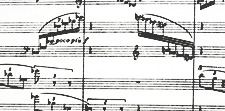Twelve Ways to Know God

Jesus defines eternal life as knowing God (Jn 17:3). What are the ways? In how many different ways can we know God, and thus know eternal life? When I take an inventory, I find twelve.
- The final, complete, definitive way, of course, is Christ, God himself in human flesh.
- His church is his body, so we know God also through the church.
- The Scriptures are the church's book. This book, like Christ himself, is called "The Word of God."
- Scripture also says we can know God in nature see Romans 1. This is an innate, spontaneous, natural knowledge. I think no one who lives by the sea, or by a little river, can be an atheist.
- Art also reveals God. I know three ex-atheists who say, "There is the music of Bach, therefore there must be a God." This too is immediate.
- Conscience is the voice of God. It speaks absolutely, with no ifs, ands, or buts. This too is immediate. [The last three ways of knowing God (4-6) are natural, while the first three are supernatural. The last three reveal three attributes of God, the three things the human spirit wants most: truth, beauty, and goodness. God has filled his creation with these three things. Here are six more ways in which we can and do know God.]
- Reason, reflecting on nature, art, or conscience, can know God by good philosophical arguments.
- Experience, life, your story, can also reveal God. You can see the hand of Providence there.
- The collective experience of the race, embodied in history and tradition, expressed in literature, also reveals God. You can know God through others' stories, through great literature.
- The saints reveal God. They are advertisements, mirrors, little Christs. They are perhaps the most effective of all means of convincing and converting people.
- Our ordinary daily experience of doing God's will will reveal God. God becomes clearer to see when the eye of the heart is purified: "Blessed are the pure of heart, for they shall see God."
- Prayer meets God—ordinary prayer. You learn more of God from a few minutes of prayerful repentance than through a lifetime in a library.
Unfortunately, Christians sometimes have family fights about these ways, and treat them as either/or instead of both/and. They all support each other, and nothing could be more foolish than treating them as rivals—for example, finding God in the church versus finding God in nature, or reason versus experience, or Christ versus art.
If you have neglected any of these ways, it would be an excellent idea to explore them. For instance, pray using great music. Or take an hour to review your life some time to see God's role in your past. Read a great book to better meet and know and glorify God. Pray about it first.
Add to this list, if you can. There are more ways of finding and knowing God than any one essay can contain. Or any one world.